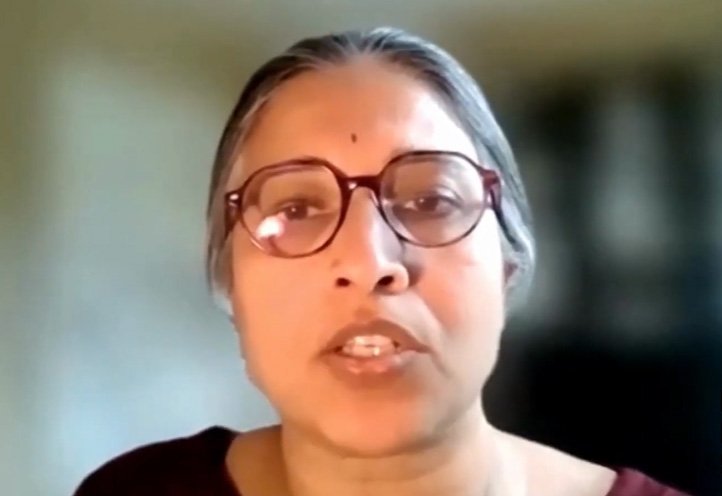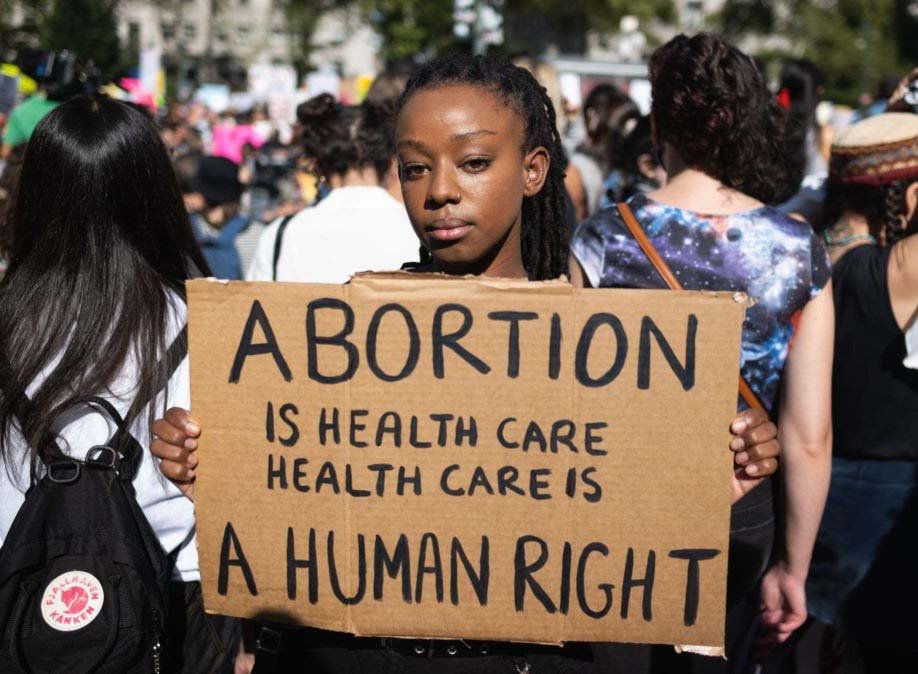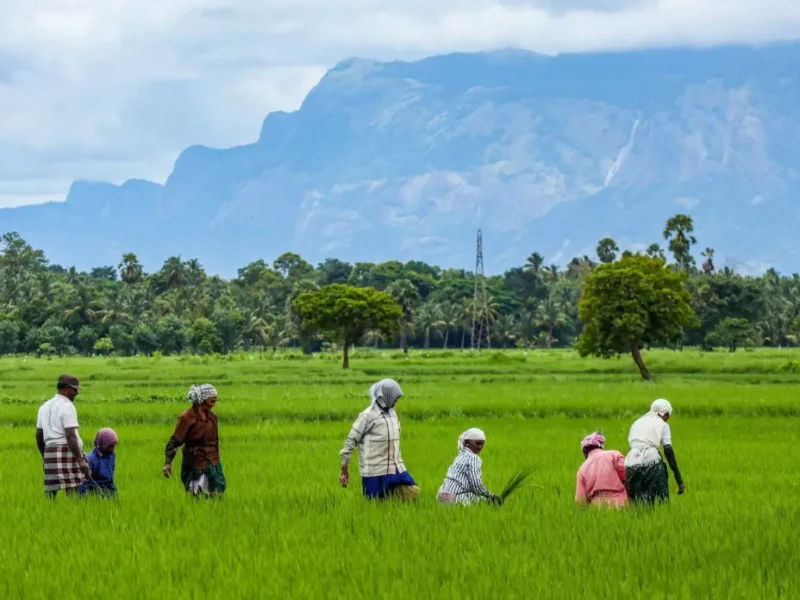Will Abortion Be The Wedge Issue In 2024?
By PETER WHITE
LOS ANGELES, CA – Seventy-five percent of voters say women and their doctors should decide; just nine percent say judges and politicians should decide.
Polls were clear before and after the 2022 midterm election. A large majority of Americans think abortion should be legal. More than any other issue, abortion rights brought people out to vote in the last election.

“The Supreme Court’s decision a few months before the 2022 midterm elections was political suicide,” said Suba Srinivasaraghavan, a field organizer with They See Blue in Virginia.
After the decision, she saw a surge in volunteering forget-out-the-vote initiatives. “More people said, ‘yes’ to field organizers, to not just go out and vote, but also to volunteer, to write cards, knock on doors and to donate to many campaigns,” Srinivasaraghavan said.
“Abortion all of a sudden became front and center for many constituents and candidates alike,” she added.
During a national briefing by Ethnic Media Services last week, five organizers explained why reproductive rights a top issue in the 2024 Presidential Election would be.
“Voters across the country and across the political spectrum said, ‘Enough is enough.’ And in every state where abortion was on the ballot, voters supported protecting and expanding access,” said Angela Vasquez-Giroux, Pro-Choice America’s Vice President of Communications and Research.
A poll conducted by Impact Research after the midterm election, found that abortion has the power to continue to drive votes in future elections. A majority (52%) of voters are concerned that Republicans will try to ban abortion care, including 74% of Black voters and 53% of non-Democrats who voted Democratic in the midterms. A plurality (48%) said they are less likely to support Republicans if they attempt to ban abortion care.
Lupe Rodriguez, National Executive Director, Latina Institute for Reproductive Justice, noted that abortion care has never been accessible for women of color. “Anti-abortion politicians have been working for decades to make abortion difficult to get, and the continued attacks on abortion access fall hardest on communities of color and people working to make ends meet,” she said.
False claims and misinformation about abortions and people who provide them have many members of the Latina and Latinx community confused about new abortion laws and where to get healthcare, says Lupe Rodriguez, National Executive Director, Latina Institute for Reproductive Justice.
The Latina Institute and the National Partnership for Women & Families released research that found that nearly 6.5 million Latinas – 42 percent of all Latinas ages 15-49 – live in the 26 states that have banned or are likely to ban abortion. They represent the largest group of women of color impacted by current or likely state bans.
The research also found that nearly 3 million Latinas living in these states are economically insecure and don’t have access to the funds they would need to travel to another state for abortion care.
“This is upsetting, but not surprising. Abortion bans fall hardest on Latinas and other communities of color who may work multiple jobs that provide no sick days or insurance coverage, and live in underserved communities,” said Rodriguez.
Although abortion is supported by a majority of voters in both major parties, Republican Party officials have distanced themselves from their membership and paid a price. Women organizing for autonomy and the right to choose to say they will pay again in 2024.
“Radical judges and politicians are taking away our fundamental rights to make decisions about if, when, and how we have a family, and we’re not going to take that sitting down. We will fight, organize, and build power, and vote until we can.
make our own decisions again,” said Yvonne Hsu, a policy chief with the National Asian Pacific American Women’s Forum.
Hsu said that Asian American women and Pacific Islanders find themselves in a place “where the clocks have literally been turned back against us”.
Abortion restrictions will make accessing abortion care more difficult, and in some cases impossible, for AAPI women, says Yvonne Hsu, Chief Policy and Government Affairs Officer, National Asian Pacific American Women’s Forum.
In June 2022, by a 6-3 vote, the Supreme Court overturned Roe v Wade in Dobbs v. Jackson Women’s Health Organization which held women do not have a constitutional right to abortion. Since then, state legislatures have enacted abortion bans in 14 states and restricted them in 12 others.
“The Dobbs decision has been yet another blow to AAPI women seeking abortion care by creating a landscape where states have been emboldened to enact their own abortion restrictions or bans,” Hsu said.
Hsu noted that cultural, economic, and logistical barriers for AAPI community members, especially those working in frontline service jobs, make traveling and getting an abortion often difficult, if not impossible.
“These impacts on the AAPI community have fueled NAPAWF’s work galvanizing Asian American women voters in critical states like Florida, Georgia, and Texas,” she said.
Currently, battles continue in several states about access to medication abortions. According to the Guttmacher Institute, a two-drug combination of mifepristone and misoprostol accounted for more than half of all facility-based abortions in 2020.
A Texas lawsuit could stop access to abortion pills nationwide if it succeeds in reversing the FDA’s approval of mifepristone. In North Carolina and West Virginia
Abortion rights advocates have filed lawsuits challenging restrictions on access to abortion pills.
“Our partners across the country are faced with ensuring their communities have access to reproductive healthcare including, safe and affordable abortion care, while also responding to other community needs,” said Ebony Baylor, Vice President of Government Affairs, In Our Own Voice: National Black Women’s Reproductive Justice Agenda.
Baylor said Black women do not live single-issue lives and when thinking about who best represents them, they consider many factors.
Ebony Baylor, VP of Government Affairs, In Our Own Voice: National Black Women’s Reproductive Justice Agenda, says denying women, especially Black women, access to abortion care will worsen America’s already high maternal mortality rate.
“Our civil and human rights are being attacked from all sides – lack of access to health care, clean water, childcare, social justice, and more are all things Black women think about when facing crucial decisions about their lives, families, and communities,” she said.
Access to the ballot box remains a big issue for Black women voters, says Baylor. “Voter suppression and subversion laws are being introduced by elected leaders in state houses across the country at an alarming rate,” she said.
How significant will reproductive rights be in 2024? Baylor noted that Black voters are not single-issue voters, but abortion rights are going to be an important issue.
“It’s going to be a deciding factor,” she said. (Ethnic Media Services)





VIJAY
/
It is beyond me as to how the free-choice loving Republicans want to enter our bedroom and decide about females’ health choices!!!
April 5, 2023